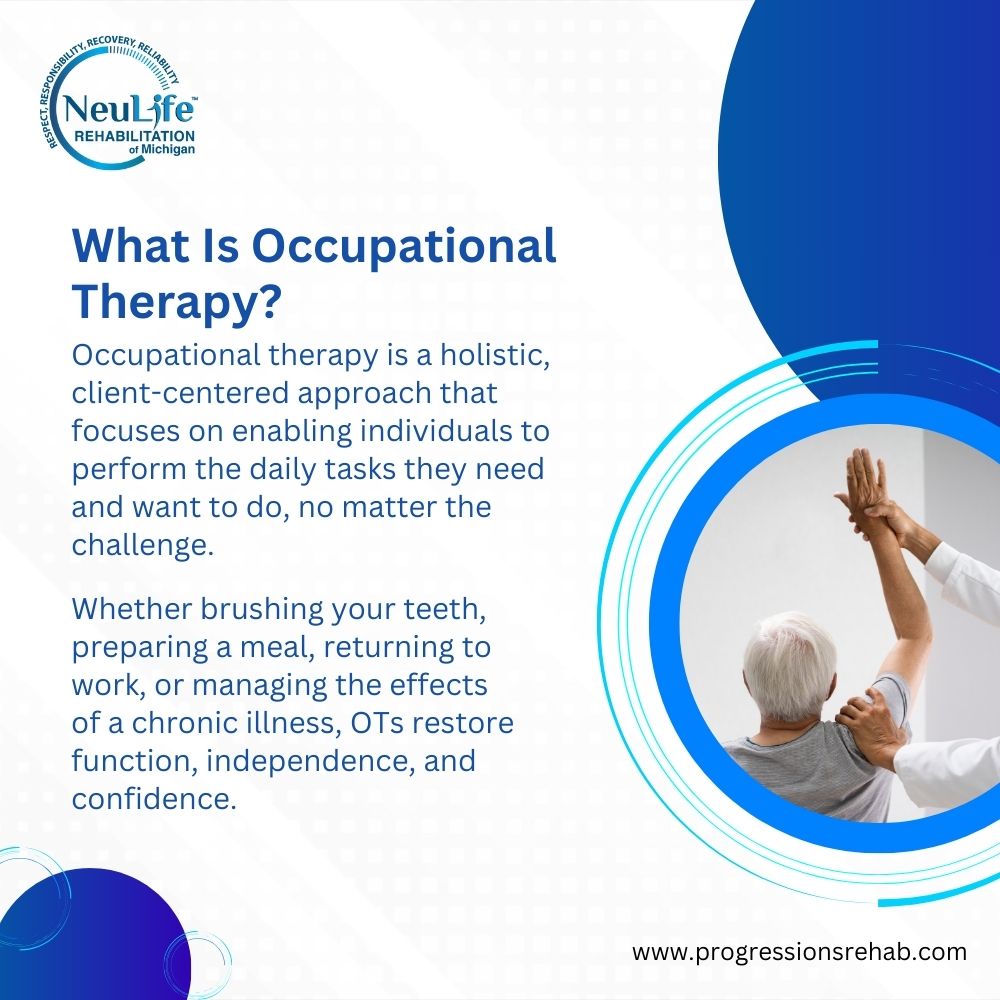Each April, we celebrate National Occupational Therapy Month, a time to honor the incredible work of occupational therapy professionals and raise awareness about their vital role in helping people live fuller, more independent lives.
Occupational therapists (OTs) are at the forefront of rehabilitation and recovery, from hospitals to schools and clinics to homes. Their mission? To help people of all ages regain the ability to participate in the everyday activities that give life meaning.
What Is Occupational Therapy?

Occupational therapy is a holistic, client-centered approach that focuses on enabling individuals to perform the daily tasks they need and want to do, no matter the challenge. Whether brushing your teeth, preparing a meal, returning to work, or managing the effects of a chronic illness, OTs restore function, independence, and confidence.
As healthcare continues to evolve, occupational therapy has become increasingly vital. With an aging population, a rise in chronic conditions and mental health challenges, and the growing emphasis on patient-centered care, OTs are now more essential than ever. They play a key role not just in recovery but also in empowering people to live with independence, dignity, and purpose.
The Role of Occupational Therapy in Rehabilitation
Rehabilitation isn’t just about healing the body—it’s about helping people reclaim their lives. That’s where occupational therapy (OT) shines. Whether someone is recovering from a stroke, surgery, injury, or chronic condition, occupational therapists play a vital role in guiding that recovery toward lasting independence.
- Physical Recovery: OTs help patients improve mobility, strength, coordination, and endurance to support daily activities.
- Cognitive Rehabilitation: For those dealing with brain injuries or neurological conditions, OTs use strategies to improve memory, attention, problem-solving, and task planning.
- Emotional and Mental Health Support: OT addresses the psychological impact of illness or injury, helping patients manage anxiety, depression, or frustration that can come with life changes.
- Environmental Adaptations: Therapists may recommend home or workplace modifications and assistive devices to improve safety and accessibility.
Occupational Therapy as Part of a Collaborative Team
Rehabilitation is never a solo effort—it’s a team sport. At the heart of that team is the occupational therapist, who works side-by-side with other healthcare professionals to provide comprehensive, coordinated care. OTs collaborate with:
- Physical Therapists: While PTs focus on restoring movement, strength, and physical function, OTs focus on how those improvements translate into real-life tasks, like climbing stairs, showering, or returning to work.
- Speech-Language Pathologists: When communication or cognitive challenges arise (e.g., after a stroke or brain injury), OTs and SLPs coordinate to help patients with thinking, speaking, and executing daily routines.
- Nurses and Physicians: OTs provide valuable insights into patient progress and daily function, which can inform medication management, discharge planning, and overall treatment goals.
- Social Workers and Mental Health Professionals: Mental and emotional wellness is crucial to recovery. OTs work with these team members to address psychosocial barriers and promote independence.
- Caregivers and Families: Perhaps most importantly, occupational therapists partner with the patient’s support system—teaching skills, recommending home modifications, and guiding caregivers through the recovery journey.
Real-World Examples of Occupational Therapy in Action
Occupational therapy transforms lives in countless ways—often through small, everyday victories that lead to significant changes. Here are just a few real-world examples of OT in action across different populations and settings:
Stroke Recovery: Regaining Daily Skills
Many individuals struggle with mobility, memory, or coordination after a stroke. An occupational therapist works with stroke survivors to relearn daily tasks like dressing, cooking, or writing. Patients regain independence and confidence in their routines through customized exercises and adaptive techniques.
Pediatric OT: Helping Children Thrive
Occupational therapy is often beneficial for children with developmental delays, autism, or sensory processing challenges. OTs use play-based interventions to improve fine motor skills, attention span, and emotional regulation, empowering children to participate fully in school, play, and social life.
Geriatric OT: Supporting Aging in Place
Older adults often face difficulties with balance, strength, and memory. Occupational therapists help seniors stay safe and independent at home by modifying their environments, introducing assistive devices, and teaching fall prevention techniques. These interventions reduce hospitalizations and enhance quality of life.
Mental Health and Daily Functioning
For individuals living with anxiety, depression, or PTSD, occupational therapy provides tools to manage everyday routines and regain structure. OTs support mental health recovery through coping strategies, goal-setting, and sensory regulation, helping people navigate life with more stability and purpose.
Rehabilitation After Injury or Surgery
Whether it’s a hand injury, joint replacement, or back surgery, OTs play a key role in physical rehabilitation. They guide patients through exercises and adaptations that restore strength and function, ensuring they can return to work, hobbies, and daily tasks as safely and efficiently as possible.
These examples show the breadth and versatility of occupational therapy—and how OTs tailor their care to each individual’s needs, goals, and lifestyle. It’s not just about recovery—it’s about rebuilding a life that feels whole again.
Celebrating National OT Month: Honoring the Heroes Behind the Healing
National Occupational Therapy Month is a time to reflect on the incredible work of occupational therapists and their profound impact on individuals’ lives. This month, we honor their compassion, creativity, and dedication in helping people overcome challenges, regain independence, and improve their overall quality of life.
As we celebrate their achievements, we encourage everyone to learn more about occupational therapy, support the work of OTs, and perhaps even consider OT as a rewarding career. OTs are making a difference every day, and this month is the perfect time to recognize and appreciate their essential contributions to healthcare and rehabilitation.
Take the First Step Toward Reclaiming Your Life with NueLife Michigan
At NueLife Michigan, we believe in the life-changing power of occupational therapy. Our dedicated therapists are passionate about helping individuals reclaim their independence, rebuild their confidence, and return to the activities that make life meaningful, primarily through long-term care for brain injury patients.
This National Occupational Therapy Month, take the first step toward a brighter, more empowered future. Whether recovering from an injury, managing a chronic condition, navigating TBI-assisted living, or supporting a loved one, we’re here to guide you every step of the way.
Contact us today to learn how our rehabilitation for brain injury in Michigan and our expert OT team can support your journey to NueLife Michigan, where healing meets purpose.
***
The material on this site is for informational purposes only and DOES NOT CONSTITUTE THE PROVIDING OF MEDICAL ADVICE, and is not intended to be a substitute for independent professional medical judgment, advice, diagnosis, or treatment. Always seek the advice of your physician or other qualified healthcare provider with any questions or concerns you may have regarding your health.



